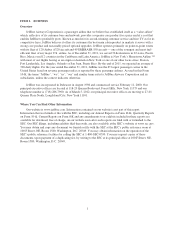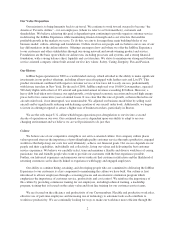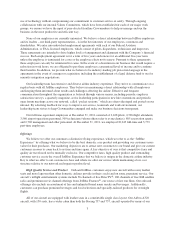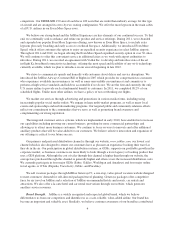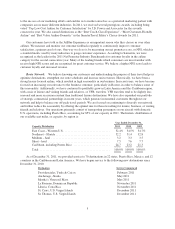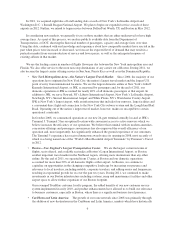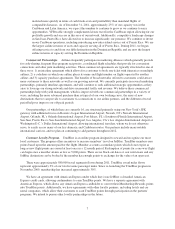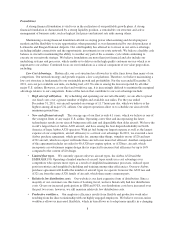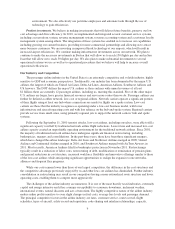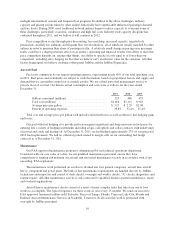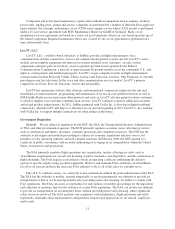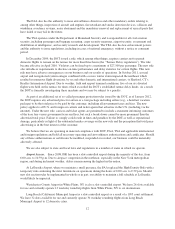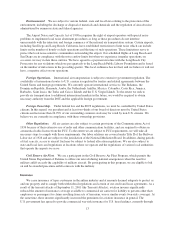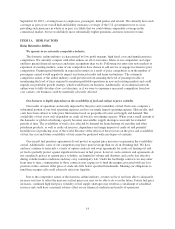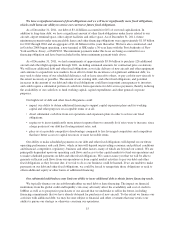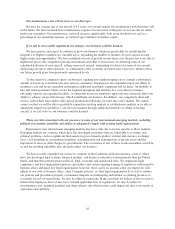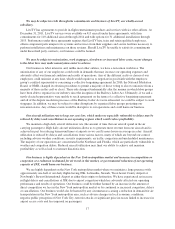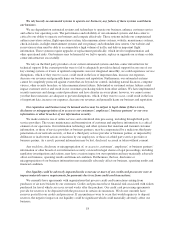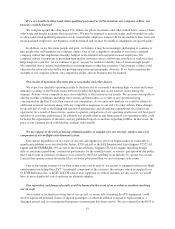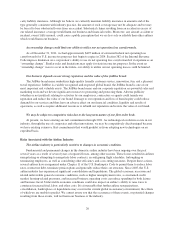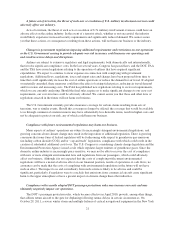JetBlue Airlines 2011 Annual Report Download - page 21
Download and view the complete annual report
Please find page 21 of the 2011 JetBlue Airlines annual report below. You can navigate through the pages in the report by either clicking on the pages listed below, or by using the keyword search tool below to find specific information within the annual report.Component and power plant maintenance, repairs and overhauls on equipment such as engines, auxiliary
power units, landing gears, pumps and avionic computers are performed by a number of different FAA-approved
repair stations. For example, maintenance of our V2500 series engines on our Airbus A320 aircraft is performed
under a 15-year service agreement with MTU Maintenance Hannover GmbH of Germany. Many of our
maintenance service agreements are based on a fixed cost per flying hour, which can vary based upon the age of
the related component. Required maintenance that is not covered by one of our agreements is performed on a
time and materials basis.
LiveTV, LLC
LiveTV, LLC, a wholly-owned subsidiary of JetBlue, provides in-flight entertainment, voice
communication and data connectivity services for commercial and general aviation aircraft. LiveTV’s assets
include certain tangible equipment and interests in systems installed on its customers’ aircraft, system
components and spare parts in inventory, an air-to-ground spectrum license granted by the Federal
Communications Commission, a network of approximately 80 ground stations across the continental U.S., and
rights to certain patents and intellectual property. LiveTV’s major competitors in the in-flight entertainment
systems market include Rockwell Collins, Thales Avionics and Panasonic Avionics. Only Panasonic is currently
providing in-seat live television. In the voice and data communication services market, LiveTV’s primary
competitors are GoGo, Row 44, Panasonic, OnAir and Aeromobile.
LiveTV has agreements with six other domestic and international commercial airlines for the sale and
installation of certain hardware, programming and maintenance of its live in-seat satellite television as well as
XM Satellite Radio service and certain other products and services. LiveTV also has general aviation customers
to which it supplies voice and data communication services. LiveTV continues to pursue additional customers
and related product enhancements. In 2011, JetBlue partnered with ViaSat Inc. to develop in-flight broadband
connectivity, which LiveTV will help us to introduce on our aircraft beginning in 2013. LiveTV is also working
with ViaSat Inc. to support inflight connectivity for other airlines in the future.
Government Regulation
General. We are subject to regulation by the DOT, the FAA, the Transportation Security Administration,
or TSA, and other governmental agencies. The DOT primarily regulates economic issues affecting air service
such as certification and fitness, insurance, consumer protection and competitive practices. The DOT has the
authority to investigate and institute proceedings to enforce its economic regulations and may assess civil
penalties, revoke operating authority and seek criminal sanctions. In February 2000, the DOT granted us a
certificate of public convenience and necessity authorizing us to engage in air transportation within the United
States, its territories and possessions.
The FAA primarily regulates flight operations and, in particular, matters affecting air safety such as
airworthiness requirements for aircraft, the licensing of pilots, mechanics and dispatchers, and the certification of
flight attendants. The FAA requires each airline to obtain an operating certificate authorizing the airline to
operate at specific airports using specified equipment. We have and maintain FAA certificates of airworthiness
for all of our aircraft and have the necessary FAA authority to fly to all of the cities we currently serve.
Like all U.S. certified carriers, we cannot fly to new destinations without the prior authorization of the FAA.
The FAA has the authority to modify, suspend temporarily or revoke permanently our authority to provide air
transportation or that of our licensed personnel, after providing notice and a hearing, for failure to comply with
FAA regulations. The FAA can assess civil penalties for such failures or institute proceedings for the imposition
and collection of monetary fines for the violation of certain FAA regulations. The FAA can revoke our authority
to provide air transportation on an emergency basis, without providing notice and a hearing, where significant
safety issues are involved. The FAA monitors our compliance with maintenance, flight operations and safety
regulations, maintains onsite representatives and performs frequent spot inspections of our aircraft, employees
and records.
11


